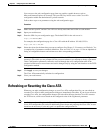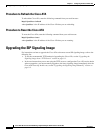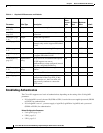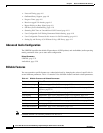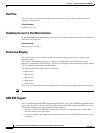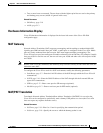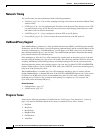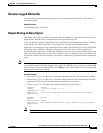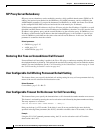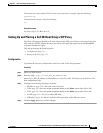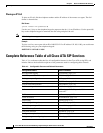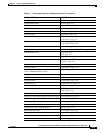
4-7
Cisco ATA 186 and Cisco ATA 188 Analog Telephone Adaptor Administrator’s Guide (SIP)
OL-3410-01
Chapter 4 Basic and Additional SIP Services
Additional SIP Services
• Two or more hosts are returned. The two hosts with the highest priorities are used as the primary
and backup proxy servers (AltGk is ignored in this case).
Related Parameters
• GkOrProxy, page 5-10
• AltGk, page 5-13
Hardware Information Display
Cisco ATA hardware information is displayed in the lower-left corner of the Cisco ATA Web
configuration page.
NAT Gateway
Network Address Translation (NAT) supports port mapping and forwarding to standard default SIP
signaling port 5060 and media base port 16384, or other ports as configured in the Cisco ATA. Media
ports are evenly numbered from the base port. NAT must support multiple port mappings. The
Cisco ATA can use up to four media ports to handle conference calls on both lines. For example, if media
base port 16384 is used for one call, the next call uses port 16386 and other calls will use ports 16388
and 16390.
Note Routers such as D-Link, WinRoute, and WinProxy may not route correctly if both caller and callee are
behind the same NAT.
To configure the Cisco ATA to work in a NAT environment, modify the following parameters:
• StaticRoute, page 5-7—Enter the LAN IP address of the NAT through which the Cisco ATA will
communicate.
• NATIP, page 5-16—Enter the WAN IP address of the NAT through which all external SIP user
agents will communicate.
• SIPPort, page 5-17—Enter a new port for SIP messages (optional).
• MediaPort, page 5-17—Enter a new base port for RTP media (optional).
NAT/PAT Translation
To maintain Network Address Translation/Port Address Translation (NAT/PAT) for a session, the
Cisco ATA can be configured to periodically send a dummy UDP packet to a server (the Cisco ATA
does not expect any response from the server).
Related Parameters
• NatTimer, page 5-19—Bits 0 to 11 are for specifying the retransmission period.
• NatServer, page 5-18—Specify the server to which the dummy packet is sent.



